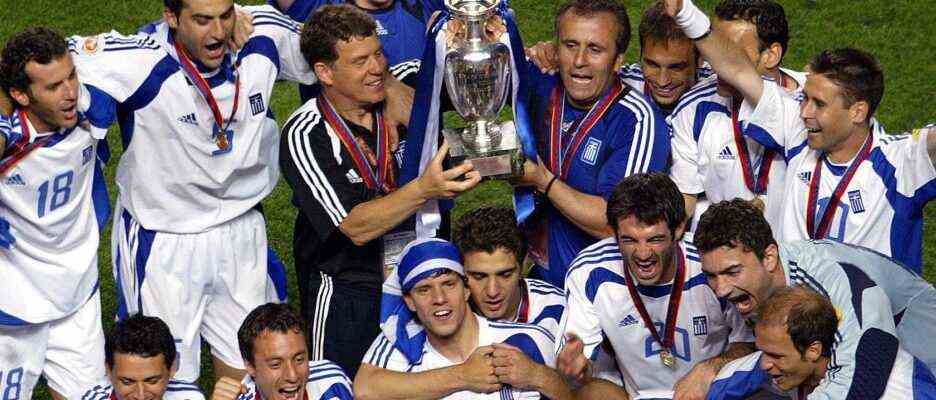Football coach Otto Rehhagel has made Werder Bremen the challenger to FC Bayern, the second division Kaiserslautern the German champions, and the Greek national team the European champions. He was a trainer of gray mice; Specialized in turning the little ones into big ones. The documentary “König Otto” tries to find out how he did this, in which the director Christopher André Marks reconstructs how Rehhagel won the 2004 European Championship with his Greeks. One of the bigger sensations in sports history, especially a game with psychological tricks that Rehhagel has mastered all his life. He talked his footballers bigger and was so convincing that the players actually got bigger, at least as long as he coached them.
At the European Championship at that time, the Greeks competed in the quarter-finals against the then reigning European champions France, with the then reigning world star Thierry Henry. They didn’t stand a chance, but the film tells what Rehhagel whispered to his defender Georgios “Giourkas” Seitaridis: “Thierry Henry doesn’t even know you. But tomorrow after the game he’ll know who you are.” So it happened, Greece won 1-0.
The film has a conventional structure, a brief look back at Rehhagel’s life, a long look back at the sensational tournament, original scenes from the games, excited TV comments, and in between, current interview sequences from Rehhagel, called Rehhagel, called Rehhagles, called King Otto, called King Otto. He is seated on a throne-like chair, now 83, and depicts the man he has always portrayed or who he is and was. Climbers from the working class; from Essen-Altenessen to the stadiums of the world, which are, after all, theaters. “In the theater, the same rule applies: clap applause and shut up,” says Rehhagel, who has not believed that he is actually a connoisseur of the fine arts. “He used to struggle to distinguish omelette from Hamlet,” said his coaching colleague Max Merkel.
Rehhagel built his wagon castle and pulled up the bridge
But Rehhagel was always someone who got to his destination by detours. When they no longer wanted him at Bayern, he became champion with Kaiserslautern. When he was not appointed national coach, he triumphed with Greece. Rehhagel processed all attacks from outside, he formed a unit with his coaching team and his players against those out there, built his wagon castle, and pulled up the bridge. “Greek football is as attractive as trying to record a pole sitting,” wrote the Time, but all the experts who described his game as the day before yesterday at the European Championships only provided Rehhagel the fuel he needed for his art of motivation. That’s how he always did it, even in the Bundesliga, the journalists liked to be enemies – his players liked to see it that way. In the film there are a few sequences from training with the Greeks, “follow me, hopp, hopp, hopp”, calls Rehhagel, and the players actually hobble after him.
The king and his loyal adjutant: national coach Otto Rehhagel (right) and his assistant coach Ioannis Topalidis after the victory.
(Photo: Filmwelt)
It’s not exactly new, at least not for someone who saw Rehhagel live at Werder back then. In principle, Rehhagel was always a friendly autocrat who spoke as if he were reading from old books, “Fortuna, the goddess of luck, has heard us”. However, who had an absolutely reliable eye for the staff. He recognized the right players, and he always had the right and loyal adjutants with him, in Bremen the manager Willi Lemke, with the Greeks the assistant Ioannis Topalidis, a Greek who had played in Germany for Starkenburgia Heppenheim, among others. Lower class, but Topalidis is a German-Greek whisperer, bilingual – that was important because Rehhagel never got used to Greek. Topalidis is the secondary hero in this film, the connecting element between coach and team, between King Otto and the Greeks. He translated what the king said and he translated it in such a way that it would reach his people. “If the criticism was too harsh, I put a little frosting on it.”
Director Marks brings everyone back in front of the camera, Rehhagel and Topalidis and Seitaridis and the other miracle workers, including Traianos Dellas, whom Rehhagel actually let play Libero as if it were 1974 again. But that was one of Rehhagel’s strengths: bringing times and epochs together, the present with the past and the past, not just in terms of football. Dellas recalls: “Rehhagel told me that I had to keep an eye on everything from defense – like the colossus of Rhodes.”
A solid, above all well-deserved homage to Otto, the very first. And a reminder that football used to be an easy game.

